#peggy maley
Explore tagged Tumblr posts
Text

Norma Eberhardt, Peggy Maley and Mary Murphy in “Live Fast, Die Young” - 1958
#vintage#hollywood#actresses#norma eberhardt#peggy maley#mary murphy#film noir#live fast die young#retro#divas#forgotten females#1958#50s#classic hollywood#vintage actresses#old hollywod glamour
16 notes
·
View notes
Text

Peggy Maley
#smoking cigarette#sexy smoker#cigarette smoking#smoking#beautiful smoker#women smoking#actress#vintage hollywood#vintage actress#hollywood#peggy maley
6 notes
·
View notes
Photo

Photo publicitaire pour la comédie musicale ‘L’Etoile des étoiles’ (Down to Earth) avec Rita Hayworth, réalisée par Alexander Hall - 1947
De gauche à droite sur la photo : Doris Houck, Peggy Maley et Dusty Anderson.
#Et pendant ce temps-là#Cinéma#Cinema#Film#Movie#Comédie musicale#Musical Comedy#L'Etoile des étoiles#Down to earth#Publicité#Advertisement#Advert#Doris Houck#Peggy Maley#Dusty Anderson#1947
16 notes
·
View notes
Text
Paul Maxey in RKO short comedies
Borrowed Blonde (1947)
In Room 303 (1947)
Dad Always Pays (1949)
#paul maxey#leon errol#vivien oakland#dorothy granger#peggy maley#phil warren#gail davis#harry harvey#lovely rko personnel#rko short comedies#borrowed blonde 1947#in room 303 1947#dad always pays 1949
1 note
·
View note
Text
INDESTRUCTIBLE MAN (1956) – Episode 190 – Decades of Horror: The Classic Era
“It was all your idea. You planned the whole job. You hired us. When you found out I stashed the money, you decided it was time for me to die. You got those two crumbs to turn state’s evidence on me. You stinkin’ rotten mouthpiece.” Everybody hates a stinkin’ rotten mouthpiece! Join this episode’s Grue-Crew – Daphne Monary-Ernsdorff, Chad Hunt, Doc Rotten, and Jeff Mohr – as they finally figure out which Lon Chaney Jr. movie is and isn’t the Indestructible Man (1956).
Decades of Horror: The Classic Era Episode 190 – Indestructible Man (1956)
Join the Crew on the Gruesome Magazine YouTube channel! Subscribe today! And click the alert to get notified of new content! https://youtube.com/gruesomemagazine
ANNOUNCEMENT Decades of Horror The Classic Era is partnering with THE CLASSIC SCI-FI MOVIE CHANNEL, THE CLASSIC HORROR MOVIE CHANNEL, and WICKED HORROR TV CHANNEL Which all now include video episodes of The Classic Era! Available on Roku, AppleTV, Amazon FireTV, AndroidTV, Online Website. Across All OTT platforms, as well as mobile, tablet, and desktop. https://classicscifichannel.com/; https://classichorrorchannel.com/; https://wickedhorrortv.com/
Synopsis: A brutal death row inmate double-crossed by his crooked lawyer gets his chance for revenge when, following his execution, a bizarre experiment brings him back to life and deadlier than ever.
Directed by: Jack Pollexfen
Writing Credits: Vy Russell and Sue Dwiggins (as Sue Bradford)
Cinematography by: John L. Russell (as John Russell Jr.)
Selected Cast:
Lon Chaney Jr. as Charles Benton (credited as Lon Chaney)
Max Showalter as Lt. Dick Chasen (credited as Casey Adams)
Marian Carr as Eva Martin (credited as Marion Carr)
Ross Elliott as Paul Lowe
Stuart Randall as Capt. John Lauder
Ken Terrell as Joe Marcellia (credited as Kenneth Terrell)
Marjorie Stapp as Hysterical Young Woman
Robert Shayne as Prof. Bradshaw
Peggy Maley as Francine
Robert Foulk as Harry
Reita Green as Carney’s Bait (credited as Rita Green)
Roy Engel as Desk Sergeant (credited as Roy Engle)
Madge Cleveland as Screaming Woman
Chet Brandenburg as Police Officer with Flamethrower (uncredited)
Russell Custer as Police Officer (uncredited)
Joe Flynn as Bradshaw’s Assistant (uncredited)
Dorothy Ford as Tall Stripper (uncredited)
Lyle Latell as Police Sergeant (uncredited)
Eddie Marr as Carney (uncredited)
Marvin Press as Squeamy Ellis (uncredited)
Fred Rapport as Observer at Crime Scene (uncredited)
Lon Chaney Jr. is the title character in Indestructible Man (1956), not to be confused with Man Made Monster (1941), The Magnetic Monster (1952), or even The Alligator People (1959). But that poster is so confusing! Despite not having many lines, Chaney still emotes the hell out of his role as “Butcher” Benton. To top it off, he’s supported by many of the usual excellent character actors. And even though the script is all chopped up, it all makes sense… sort of.
At the time of this writing, Indestructible Man (1956) is available to stream from the Classic Horror Movie Channel, Wicked Horror TV, Hoopla, Tubi, Pluto TV, Screambox, Amazon Prime, and MGM+.
Gruesome Magazine’s Decades of Horror: The Classic Era records a new episode every two weeks. Next in their very flexible schedule – this one chosen by Doc – is Planet of the Apes (1968)! Oh, baby!! The Grue Crew has been waiting to get their stinking paws on this one!!
Please let them know how they’re doing! They want to hear from you – the coolest, grooviest fans: leave them a message or leave a comment on the Gruesome Magazine YouTube channel, the site, or email the Decades of Horror: The Classic Era podcast hosts at [email protected]
To each of you from each of them, “Thank you so much for watching and listening!”
Check out this episode!
2 notes
·
View notes
Text
Fritz Lang
La petite mort. Trains and tunnels and the overwhelming urge of sex and death. An orgasm is like a little death. Or, so the French tell us.

”He’s done things to me I can’t even talk about.”
“Human Desire” is based on the same source material by Émile Zola as Jean Renoir’s 1938 film, “La Bête Humaine.” Although, it’s fair to say the French haven’t cornered the market on sex, death, or sadism.
Both films take place in and around a train yard. Jeff Warren (Glenn Ford) is recently returned from serving in Korea. He finds the simplest of pleasures piloting massive, gorgeous locomotives and smoking cigarettes. The symbolism works all around. Things get silly when he invites wholesome, young Jean (Peggy Maley) to climb on board and pull his train whistle. Incidentally, Jeff is like a brother to Jean. He’s taken an interest now that she’s “grown up.” Oy.
During the Hays Code Era, American films had rules about characters getting what they deserve. What do you call it when a character receives a punishment worse than they deserve? Film noir, I guess. What do you call it when that person is a woman? America.
[Spoiler] Vicki Buckley (Gloria Grahame) has been raped at 16 by a father figure, continually beaten and tortured by her husband — Carl Buckley (Broderick Crawford) — blackmailed for a crime she didn’t commit, and finally, strangled to death by her husband. All for love, of course.
Recently, a woman in Texas, whose baby’s heart stopped beating in her second trimester, was told to go home to manage her own miscarriage. Doctors are afraid they will be arrested for performing the safe, normal procedure. [The New Yorker December 2, 2024, “The Texas Exodus,” p. 12] The state of Texas has a sexual fetish. Eros and Thanatos. Like Carl Buckley, they seem to confuse sexual sadism and love.
Jeff is back from a war that isn’t the noble sacrifice of WWII. We just kill because we are told to kill.
Vicki: ”Is it difficult to kill a man?”
Jeff: ”It’s the easiest thing in the world.”
The most compassionate and ethical act in the film is when Jeff, sent by Vicki to kill drunk, depressed Buckley — ok, so she deserves her fate a little bit — spares Buckley’s life. He just couldn’t do it to someone so helpless.
Poor, alcoholic, sadistic, borderline-personality-disorder Buckley and his lonely patrol on the train tracks:

”I don’t know too much about the kind of love that makes people hurt one another. I don’t think I want to know.”
Freud asserts that the destructive energy of the death drive is “alloyed” with the life-affirming aims of the sexual drive, creating the sadistic impulse (The Economic Problem of Masochism, 1924). At the film’s climax, Jeff pilots the train where Vicki makes her escape from Buckley. Jeff has left her, but he’s also secured the paper from Buckley that implicates Vicki in murder. Alone with her in the train cabin, Buckley confronts Vicki, and she is defiant. Foreplay as strangulation.

And a good smoke after.


Love, abuse, and murder walk hand-in-hand. Film Noir questions the myth of being human. It questions the true nature of love. Love disappears. In its place are lust, desire, and power.
0 notes
Text
Rest in peace to stars that are now Angels in heaven
Mary Anissa Jones,Eleanor Cammack"Cammie"King, River Jude Phoenix, Niña Sophia Gabrielle "Sophie" Corullo, Judith Barsi, Heather Michele O'Rourke, Lucille Ricksen, Judy Garland, Margaret Hamilton, Clara Blandick, Terry, Shirley Temple Black 1928-2014, Baby Leroy, baby Peggy Montgomery, Peggy cartwright, Darla Jean Hood, Jean Darling, Peaches Jackson, Mary Ann Jackson, Dorothy DeBorba, Mary Kornman, Mildred Kornman, Carl Weathers, Carl Switzer, Billie Burke, Roberts Blossom, Jim Nabors, Frank Sutton, John Candy, Raymond Burr, Taruni Sachdev, Pauline Starke, Geraldine Jane Jacobi Russell, Ernestine Jane Geraldine Russell, Geraldine Brooks, Katharine Hepburn, Margot Mosher Merrill, Ruth Elizabeth "Bette" Davis, Walt Disney, Roald Dahl, Olivia Newton-John, Susan Buckner, Lisa Loring, Betty Jane Bierce, better known by her stage name Jane "Poni" Adams, Mary Treen, Dorothy Dell, Grace Ethel Cecile Rosalie Allen, Aileen Pringle, Roscoe Conkling "Fatty" Arbuckle, Ida Kitaeva Raphael, Virginia Mayo, Edna Purviance, Vivien Leigh, Virginia Weidler, Jane Withers, Clarence Nash, Shirley Jean Rickert, Bridgette Andersen, Dominique Dunne, Samantha Reed Smith, Pal, Virginia Rappe, Katharina Schratt, Hattie McDaniel, George Burns, Michael Gambon, Alan Rickman, Gene Wilder, Jack Albertson, Matthew Garber, Robbie Coltrane, Betty Tanner, Elizabeth Taylor, Peggy Maley, Peggy Ann Garner, Mary Margaret Peggy Wood, Dorothy McGuire, Peggy Mondo, Joanna Moore, Shirley Mills, Wayne Allwine, Charlie Chaplin, Virginia Karns , Stan Laurel, Hannah Chaplin, Mary Pickford, Jackie Coogan, Mildred Harris, Lita Grey, Paulette Goddard, Peggy Moran, Florence Lois Weber, Peggy Cass, Peggie Castle, Virginia Lee, Virginia Leith, Virginia Wood, Virginia Welles, Michael Lerner, June Marlowe, Carol Tevis, Jane Adams, Joan Crawford, Mary Ellen Trainor, Betty Ann Bruno, Anne Baxter, Greta Garbo, William Wyler, Robin Williams, May Robson, Mary Astor, Jane Darwell, Linda Darnell, Lloyd Berry, Pauline Newstone, Jean Hagen, Allison Hayes, Margaret Hayes, Anissa Jones, Sophie Firth, Edith Barrett, Eve Meyer, Taruni Sachdev my edit to those who passed away
1 note
·
View note
Text
The Wild One (Laslo Benedek, 1953) Cast: Marlon Brando, Mary Murphy, Robert Keith, Lee Marvin, Jay C. Flippen, Peggy Maley, Hugh Sanders, Ray Teal, John Brown, Will Wright, Robert Osterloh, William Vedder, Yvonne Doughty. Screenplay: John Paxton, based on a story by Frank Rooney. Cinematography: Hal Mohr. Production design: Rudolph Sternad. Film editing: Al Clark. Music: Leith Stevens. The best performance in The Wild One isn’t Marlon Brando’s, it’s Lee Marvin as Chino, the head of a rival motorcycle gang. Marvin brings a looseness and wit to the role that is lacking in Brando’s performance, though the role itself calls on Brando to do little but act sullen. He also looks a little porky in his jeans and leather jacket, and his somewhat high-pitched voice gives an epicene quality to Johnny Strabler, leader of the Black Rebels Motorcycle Club. Brando does, however, get the film’s most familiar line: When Johnny is asked what he’s rebelling against, he’s drumming to the beat of the music on the jukebox and retorts, “What’ve you got?” But it’s a measure of the general mediocrity of The Wild One that this exchange is immediately reprised by someone telling others about Johnny’s retort, essentially stepping on the line. There are a few good moments in the film, mostly contributed by Marvin and by some effective choreography of the motorcycle riders, as in the scene in which good girl Kathie Bleeker (Mary Murphy) is menaced by the gang and then rescued by Johnny. But censorship sapped the life out of the film: The motorcycle gangs are scarcely more intimidating than fraternity boys on a spree. There’s an attempt to spice things up with a scene between Johnny and Britches (Yvonne Doughty), a female hanger-on with the rival gang, suggesting that they once had something going on, but the bit goes nowhere and seems mainly designed to allow the actress to display her perky breasts in a tight sweater. As with any of the countless biker movies that capitalized on the box office success of The Wild One, there’s a queer subtext to be explicated in all this male bonding, but it doesn’t add much to a movie that now seems as dated as the flaming youth films of the 1920s.
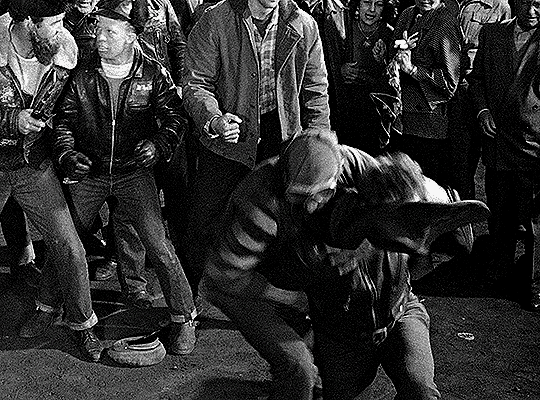
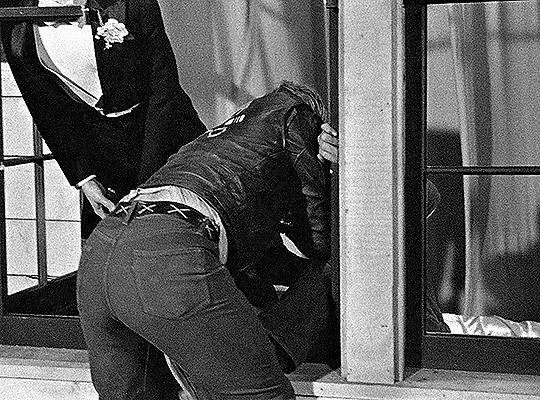

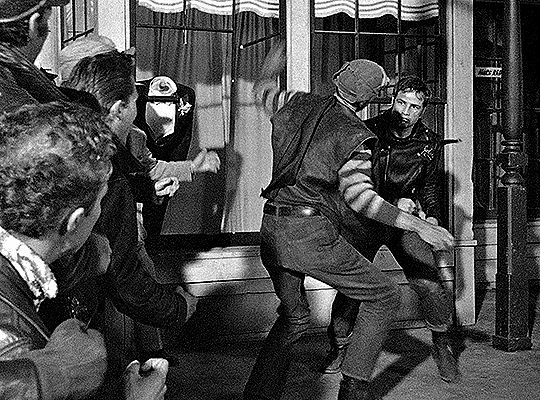
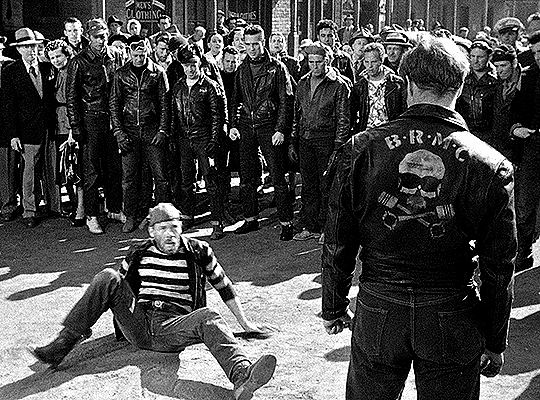


Johnny (Marlon Brando) and Chino (Lee Marvin) The Wild One (1953) dir. László Benedek
403 notes
·
View notes
Text



Human Desire (1954)
213 notes
·
View notes
Photo

Norma Eberhardt Mary Murphy Peggy Maley
11 notes
·
View notes
Text
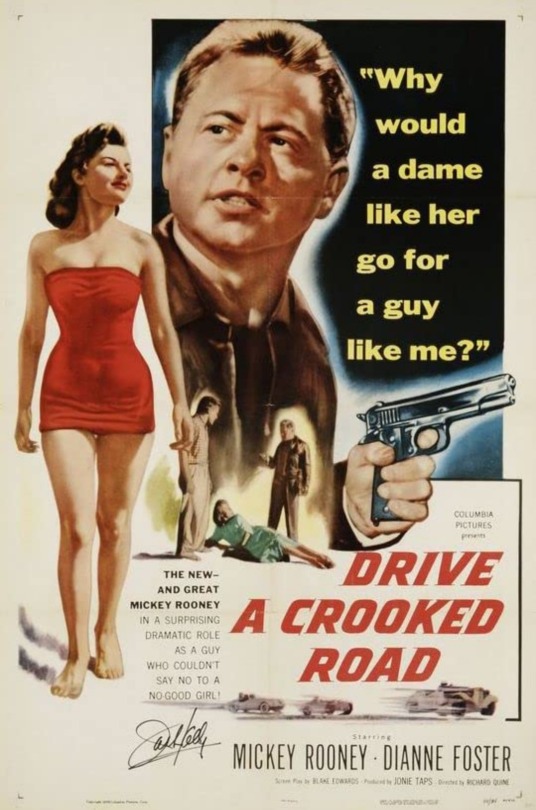
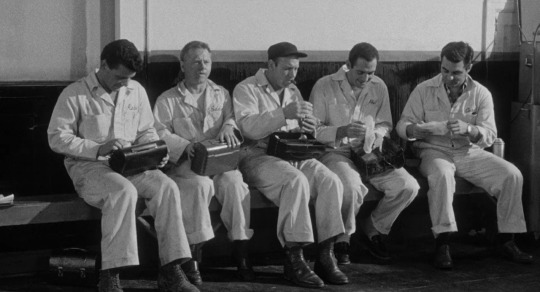
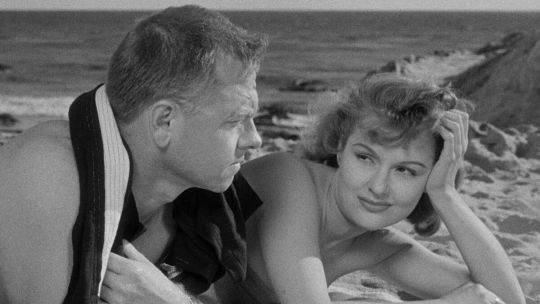
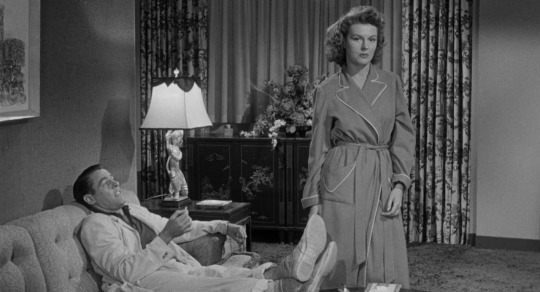
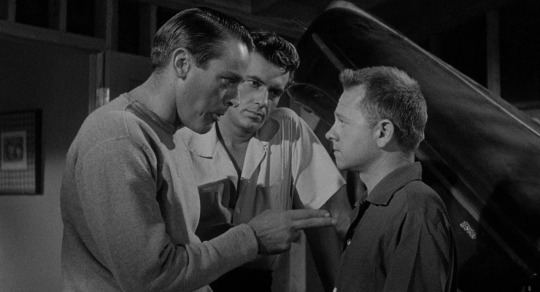
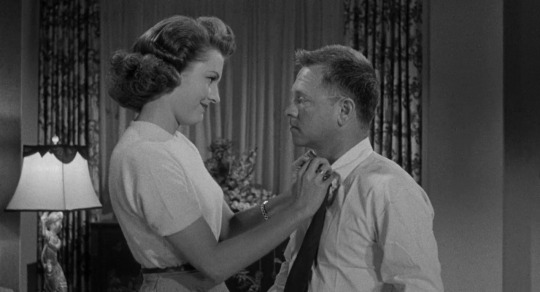
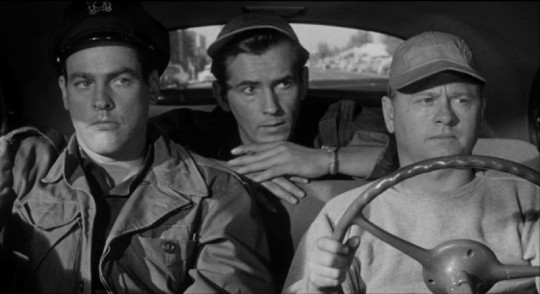
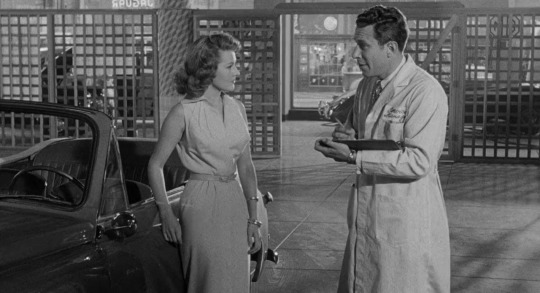
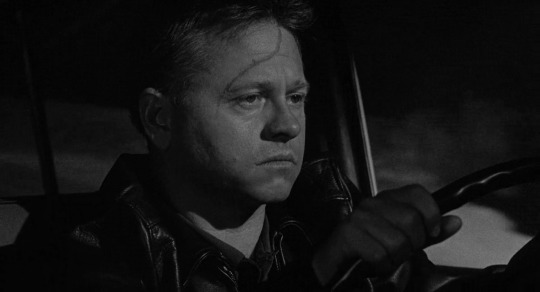
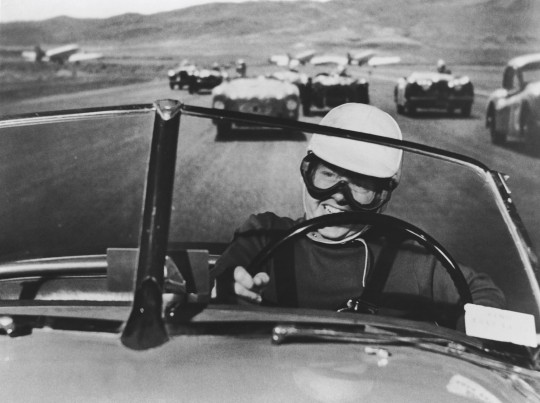
Drive a Crooked Road (1954)
"Tell me something, Shannon. Always wondered what goes through people's minds in a spot like this. No views on the subject, huh? Come now, Shannon, you must be thinking about dying."
#Drive a Crooked Road#film noir#american cinema#1954#richard quine#blake edwards#James Benson Nablo#mickey rooney#dianne foster#kevin mccarthy#jack kelly#harry landers#jerry paris#paul picerni#dick crockett#irene bolton#peggy maley#mort mills#jeffrey stone#poor Mickey Rooney. you can only wonder how he felt when his agent handed him this script in which he's repeatedly described as a loser and#a creep and a short inhuman weirdo. Blake Edwards not a fan? anyway Little Mickey is an amateur race car driver and pro mechanic who gets#hustled into being a getaway driver for a robbery because he's literally so touch starved and pathetic that Dianne Foster only has to wink#at him and he turns to a life of crime. actually Rooney really is great in this; its a real understated subtle performance as a downtrodden#loner who gets in over his (low down) head. Kevin Mccarthy has a scene stealing support part as the sleazy villain but performances aside#this is pretty familiar noir territory: kind of a retread of The Killers only without the investigative aspect that makes that film so#interesting. Edwards' script is pretty sharp and there's some fine moments (including an impressively desolate and emotionally brutal final#shot) but it's a bit slow getting there and it's none too creative on the whole. fine middling noir but not a special film really
4 notes
·
View notes
Photo




The Bigamist (1953) Ida Lupino
November 28th 2020
11 notes
·
View notes
Photo

- If this a sample of your work, you’re not very good at pick-ups. - I know. I haven’t had very much experience at it. This is the first time I ever tried to pick up a girl. - Gee, that’s too bad. - I should be better. - How’s that? - Well I’m of those terrible fellows that frightens the farmer’s daughter, you know? I’m a traveling salesman, only a kind of backwards one. - Yeah, you could use a few tips like “I’m sad and lonely, just want someone to talk to. Don’t you know any nice girl in this great big town, how about a few laughs?”. - You know, I wanted to say all those things to you just now, only on the level. Thanks, coach.
The Bigamist, Ida Lupino (1953)
#Ida Lupino#Collier Young#Joan Fontaine#Edmond O'Brien#Edmund Gwenn#Kenneth Tobey#Jane Darwell#Peggy Maley#Lilian Fontaine#George E. Diskant#Leith Stevens#Stanford Tischler#1953#woman director
6 notes
·
View notes
Text
Fort Petticoat 1957
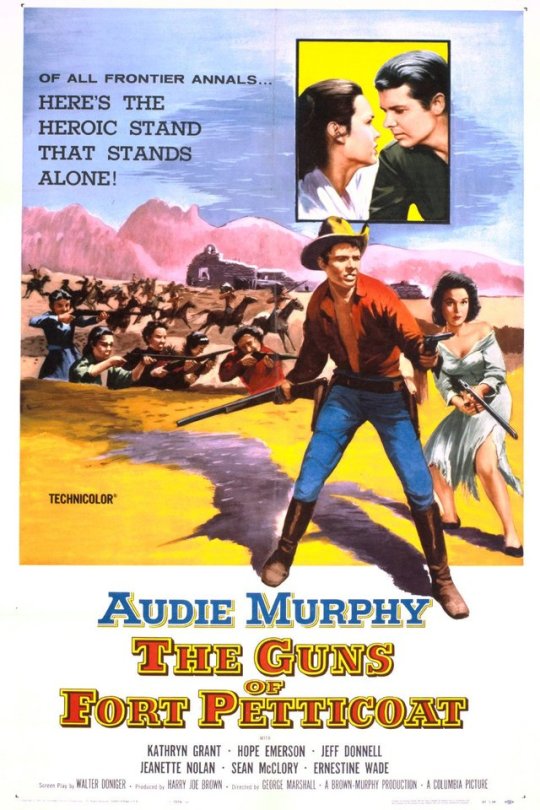
#fort petticoat#audie murphy#kathryn grant#hope emerson#jeff donnell#jeanette nolan#sean mcclory#ernestine wade#peggy maley#isobel elsom#patricia tiernan#kim charney#nestor pavia#james griffith#pamela baird#irene barton#edwin chandler#cecil combs#dorothy crider#john dierkes#evelyn finley#frank hagney#mary adams hayes#charles horvath#reed howes#chief geronimo kuth le#francis mcdonald#sharon lucas#charles meredith#madge meredith
21 notes
·
View notes
Photo

Marlon Brando, Peggy Maley et Yvonne Doughty, 1953.
19 notes
·
View notes
Photo

Audie Murphy, Hope Emerson, Jeff Donnell, Kathryn Grant, Peggy Maley, and Jeanette Nolan in The Guns of Fort Petticoat, 1957 #audiemurphy https://www.instagram.com/p/B4HtRaDnQui/?igshid=1sifzsuowtwy3
1 note
·
View note